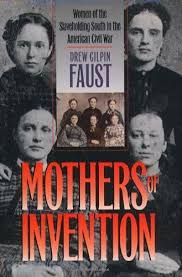What We’re Reading: Chris Sniezek

A blog post by Chris Sniezek, Manager (Esther’s Place). To read more posts from Chris, click here.

While all books by Faust are excellent pieces, this is probably one of her best written and widely acclaimed books on Civil War history. Faust leads the reader into a world in chaos as aristocratic society across the South is upturned in 1861 and daftly shows how high-class Southern women navigated the crisis of war. Focusing on the home front rather than the military front means Faust is able to thoroughly parse through thousands upon thousands of letters, memoirs, and diary excerpts to create the image of a society in change.
I have two sections which I find particularly fascinating though. Chapter six, “To Be an Old Maid,” explores the way courtship and relationship expectations shifted as the war dragged on and more men were killed or returned gravely wounded. As the war dragged on, expectations that surrounded courtship changed as well. Prior to the war, a man with a speech impediment might lose his courtship potential to a man without the impediment, whereas the longer the war dragged on, he might be more “desirable” over the other man who lost his leg or arm and was no longer able to “provide for the family” the same way anymore.
In a similar light, the Epilogue wraps up the book with a nod toward the shifted social structures that evolved in the years immediately after the war. With a third of the Southern male population maimed or killed, women (especially upper-class women) found themselves adjusting to newly defined gender roles and taking on more responsibilities than they had previously. As a result, women’s organizations began to flourish more so than they had in the antebellum years because now there was a direct link between their interests and the societal movements. Temperance movements, education reform, civic reforms, religious reforms, and “literacy leagues” found overwhelming support in the New South.
